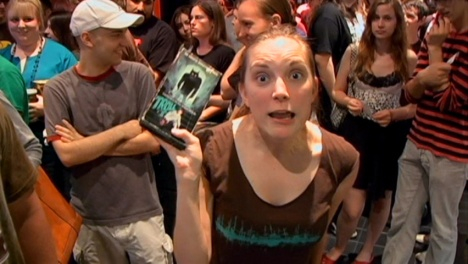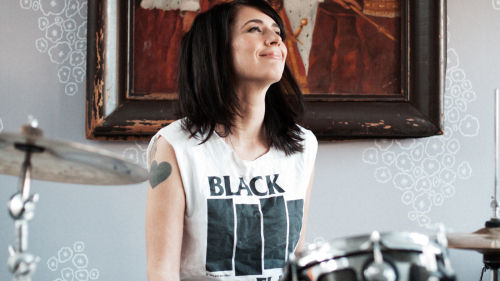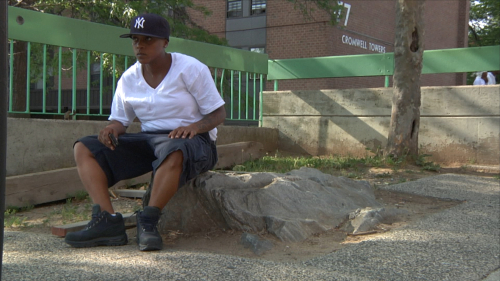If you’re a voracious documentary consumer like me, you’ve long since burned through the top-tier, can’t-miss films streaming online. You’ve seen all the hits, like Thin Blue Line, Hoop Dreams and Restrepo and are ready for the deep cuts. HuluPlus and Netflix are ever-growing repositories of documentary goodness, offering everything from Justin Bieber to genocide at the click of a button. But sorting through the huge selection of movies available can be daunting. And let me be frank: there’s a lot of crap out there. Never fear, I’ve done the work for you. Without further ado, here are the ten best under-the-radar documentaries currently streaming.
The Punk Singer (Netflix)
This film traces the story of Kathleen Hanna; Bikini Kill and Le Tigre front woman and original Riot Grrrl. Using archival footage and interviews with friends, bandmates and Hanna herself, the film covers more than just one woman’s (pretty damn fascinating) history, but the history of a movement – both musical and social. Hanna unexpectedly retreated from the music scene in 2005, citing artistic burnout, but as the film eventually reveals, the real reason for her withdrawal was something else altogether. A true badass in her early years, The Punk Singer shows that as Hanna faces an uncertain future, she’s still not one to shy away from a fight.
Shut Up Little Man! (HuluPlus)
In San Francisco in the 1980s, two friends tape-recorded the loud (and bizarre) nightly fights of their neighbors in the apartment next door. They passed the homemade cassette tapes to their friends and the recordings quickly went viral, before going viral was a thing. Shut Up Little Man! traces the story of the incredibly widespread effect the tapes had and the staggering number of players that eventually became involved. It’s a study on privacy, art, intellectual property and exploitation. Amid the giggles and jaunty animation, an ever-growing feeling of unease creeps in. And it sticks with you long after it movie ends.
Cropsey (Netflix, HuluPlus)
We all grew up hearing the urban legends about our own local boogeyman; usually a guy with a hook for a hand or wielding an axe, who also may or may not have escaped from a mental institution. He lurks in the shadows, snatching children off the street who are never heard from again. But they were just stories, right? Not in one Staten Island community. Cropsey is the chilling and tragic story of fiction becoming fact when the disappearances of several children were traced back to one very real boogeyman.
The Queen of Versailles (Netflix, HuluPlus)
Bravo’s Real Housewives have nothing on Jackie Siegel. The wife of billionaire David Siegel, Jackie is the bleached and tanned titular “queen” in this utterly transfixing documentary. The film follows the Siegels as they build the Florida billionaire’s version of France’s 17th century palace, set to be the largest residence in America. Unexpectedly, work on the extravagant 90,000 square foot home grinds to a halt in 2008 as the economy takes a nosedive and David Siegel’s timeshare business falters. The Siegels are forced put their dream home on the market and face the real possibility of downsizing.
Amidst a bizarre world of Chicken McNuggets and caviar, fur coats and denim cutoffs, the Siegels offer up an emotional roller coaster for the observer. The glimpses at their humanity are effective, but are quickly overshadowed by uglier moments ranging from neglected pets to David Seigel’s smug claim that he personally got George W. Bush elected through means that “may not necessarily have been legal.” Involuntary shudders abound.

Best Worst Movie ( Michael Paul Stephenson)
Best Worst Movie (HuluPlus)
If you have never seen the cult classic Troll 2, do yourself a favor and watch it immediately. But be sure to watch with friends – not because it’s scary (it’s not), but because you will want witnesses to confirm that you are not, in fact, having some kind of fever dream. Troll 2, released in 1989, is widely considered the worst movie ever made. Despite the title, it is neither a sequel to anything, nor about trolls. Watching the movie will clear nothing up, but you will be wildly entertained. Make your viewing party a double feature and follow it up with Best Worst Movie, an utterly charming and fantastic documentary that is both a “making of” and a “where are they now?” of Troll 2. It’s a rich, endearingly human, often hilarious and surprisingly sweet film. Not to be missed by any movie fan.
The Woman Who Wasn’t There (Netflix, HuluPlus)
This is the 9/11 story I guarantee you have not heard before. It may sound like a cop-out for me to say this, but the less you know about this movie before you watch it, the better. Don’t even read the online description. Just press play and let it unfold.
Hot Coffee (Netflix)
You’ve no doubt heard the story of the woman who spilled hot coffee on herself and sued McDonald’s for gobs of money, right? Everyone from late night talk show hosts to Jerry Seinfeld and company made great hay out of this case, widely categorized as a greedy idiot hoping to cash in on the “lawsuit lotto”. The case became the icon of the frivolous lawsuit, often cited by tort reformers as the bane of the U.S. legal system. But like a giant game of telephone, the true facts of the McDonald’s case have been completely (and sometimes intentionally) distorted.
It is not an exaggeration to say that learning what really happened in this case is jaw-dropping. Hot Coffee not only reveals the truth behind a lawsuit that became both a political pawn and a punchline, but also provides a fascinating and often troubling look at tort reform and Americans’ basic access to the legal system.
Miss Representation (Netflix)
It’s sobering to learn that when they’re young, an equal number of boys and girls want to be president. But by age 15, many more boys than girls want to be president. Why is that? As Miss Representation explains: “You can’t be what you can’t see”. This eye-opening look into how women are portrayed in the media features commentary from Nancy Pelosi, Cory Booker, Condoleezza Rice, Gloria Steinem, and many others. The film focuses not only on the lack of empowering female role models in the media, but also rampant hypersexualization, demeaning imagery and egregious double standards. This is required viewing not just for girls and women, but everyone. Watch with a wooden spoon handy for any rage-induced tooth gnashing.
We Were Here (Netflix)
Somewhat overshadowed by the Academy Award-nominated How to Survive a Plague, the subtle and moving documentary We Were Here examines the AIDS epidemic in San Francisco in the 1980s and ‘90s. From the perspective of five people who lived through the crisis, the film shows how the devastating disease ravaged their community and changed their lives forever. It feels right to distill something so epically huge down to a more manageable scale so that it’s possible to even begin to digest it. We Were Here is incredibly powerful, engrossing and sometimes difficult to bear. But bear it we should. Of all the American tragedies of the modern era, the examination and remembrance of the AIDS crisis and its incredible human toll remains shamefully lacking. We Were Here goes a long way to correct that.
The House I Live In (Netflix)
Joining the voices of many critics of the so-called “war on drugs”, Eugene Jarecki’s film lays out the true cost of the United States’ current policies and the need for reform. The House I Live In is so convincing, that it’s tempting to see it as propaganda rather than journalism, but propaganda it is not. The failure of current drug policies is just so undeniable that there is literally no argument for it. The House I Live In shows how the cost of the war on drugs has resulted in prisons overcrowded with non-violent offenders, addicts being treated as criminals, families destroyed, obscene amounts of money wasted, and no relief in sight. Jarecki has created an incredibly effective film and has amassed an astounding amount of evidence as well as highly effective personal stories. Drug policy reform is a complex issue, involving judicial, economic and social factors, but what it really comes down to, as Jarecki argues, is the misperception at every level that drug use is the cause of crime, poverty and other ills, instead of the other way around.






